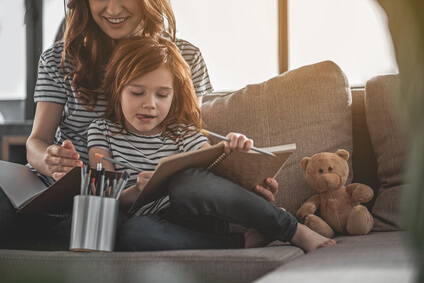I decided one day that I wanted to do something fun with my daughter, just she and I. I came across an event where people get together and paint a one-of-a-kind masterpiece at a local venue. They provide the instructor, canvas, and the paint but it’s up to you to bring creativity. I thought this would be fun and also give me quality time with my barely teenage daughter (if she still remembers who I am considering how often she’s with friends or attached to her cellular device). When we arrived we sat next to another mother who must have had the same idea, since she had brought her daughter who was around the same age as mine. Here I sat, excited that we might be painting the next Picasso. My daughter was a little nervous as she had mentioned earlier that she didn’t get a single artistic gene from her parents. After all, we were promised that “anyone can paint”.
The instructor started telling us what paints to mix together to create the background. At first, my daughter would ask things like “What color does this need to be?” my response was “Whatever color you’d like. You get to choose.” About halfway through the night, she wasn’t asking me questions anymore, she was just enjoying painting and the creation in front of her. I couldn’t help but hear the mother next to me say “You’re doing it wrong. You need more yellow ones. Add more water.” Throughout the night, I continued to hear her say things like “Do you need help?” “Do you want me to do it for you?” “You need to outline that.” “Here, let me fix that for you.”
At the end of the two-hour event, people were finishing the last details of their paintings. I looked over at my daughter. The look on her face was that of pure satisfaction. She was proud of her art and of what she had accomplished even if she had “messed up a little”. She was amazed that she, herself, had created something beautiful.
I couldn’t help but look around at everyone else’s paintings to see how differently they all looked. When I looked over at the mother and her daughter, I noticed her trying to console her daughter. Her daughter was crying – big alligator tears crying. I hear the mother say “What’s wrong?” The little girl responded with “I hate it. It’s ugly.” I was confused. Her painting looked as good as everyone else’s, if not better. I wondered why she would be so upset and then I realized that it was because she didn’t create it. She didn’t have a painting of her own to be proud of. More importantly, she didn’t learn the valuable lesson of making mistakes. Mistakes teach us a lot about what we are capable of. They help us be more understanding, open-minded and forgiving with ourselves and others. They help us grow and advance.
You may have heard the term “Helicopter Parent” before. Helicopter parenting is defined as a style of parenting in which an overprotective parent discourages a child’s independence by being too involved in their child’s life. A recent article by the American Psychological Association explains how over-controlling parenting is associated with the inability to self-regulate emotions and behavior. Researchers followed the same 422 children over an eight-year span as part of a study of social and emotional development. They found that helicopter parenting when the child was 2 years was associated with poorer emotional and behavioral regulation at age 5. During the assessment at age 5, they found that the greater the child’s emotional regulation, the less likely he or she was to have emotional problems. Those children with better emotional regulation at age 5 had better social skills and were more productive in school at age 10. They were able to calm themselves in stressful situations, conducted themselves appropriately, and had an easier time adjusting to a school environment.
A typical helicopter parent will swoop in at any sign of challenge or discomfort. In other words, they “hover”. They solve their children’s problems and make most of their decisions. Some parents don’t even know that they are doing this. Although they have only the best intentions to protect and help their children, it can be harmful to their children’s emotional and developmental well-being and can affect them into adulthood. Helicopter parenting can interfere with a child’s ability to develop independence, self-esteem, coping skills, life skills, self-worth, and the ability to problem-solve. It can also increase anxiety or give them a sense of entitlement. Allowing your child room to learn from trial and error helps facilitate self-confidence, pride, and feeling a sense of achievement.
How do I know if I’m a helicopter parent? Do you forbid your toddler to feed himself in fear he might make a mess? When the other children aren’t sharing toys, do you speak for your child? Are you over-involved in school or influence the teachers to change grades? Do you micromanage tasks or chores? Do you immediately try to fix every unpleasant emotion? Do you try to resolve every interpersonal conflict for your child? Do you complete your child’s homework assignments for them? Are you quick to criticize when your child doesn’t perform at your level of expectation? These are some examples of “hover” style parenting.
We learn from failure, from getting it wrong the first time and learning what we’ll do or not do next time. If your children always rely on you and don’t learn how to work through things and solve problems on their own, how can you expect that they will have those skills as an adult?
As parents, we want to be there for our kids, but when your parenting style interferes with them learning how to be independent, you may need to take a step back. As long as the environment is safe physically and emotionally for everyone, let your kids make some mistakes. Help them to feel confident in themselves and feel proud when they accomplish something on their own. It’s easier said than done I know. After all, we want to protect these precious gifts we’ve been given, but it’s in their best interest to learn how to get back up after they fall. Doing what is best for your children is sometimes allowing them to figure it out on their own.
By Hailey Heap
Operations Director, Canyon View Pediatrics
Physician note,
I love articles like this because the researchers do long term follow up studies to determine the influence of parenting on child behavior outcomes. It’s what we all want to know – how do I interact with my kids to make an impact for good on their permanent character? I first saw this article as a press release. It came as one of those “eureka” moments where someone proved how to do it right. Hailey did a great job depicting the author’s conclusions. As I delved into the study details a few issues became apparent:
- Eight years of longitudinal research is hard to do. The Study had 84% retention of families in the study. Much can be learned from this type of research.
- Metrics analyzing behavior showed that the group of kids with a higher rate of externalizing or acting out behaviors at age 2 years went on to have more difficulty with emotional regulation at age 5 years and 10 years. Why this happens may be complicated. These kids may have had more difficult personalities, experienced more chaos at home, had underlying mental health burden or had parents with lower parenting skills, etc. For whatever reason, the children manifesting more behavior and emotional problems at 2 years of age went on to have more difficulty in the future.
- The only measure of “over-controlling parenting” done was an observation of mother-child play at two years of age with scoring done from the Early Parenting Coding System. Researchers observed play style and child’s cooperation with toy pick up as well as the mother’s efforts to elicit cooperation. “Over-controlling Parents” were noted to be “too strict or demanding with regards to the child’s behavior, constantly guiding and creating a structured environment, commands were frequently repeated or accompanied by physical manipulations”. It may be hard to know how these observations translate into the home interactions over the next eight years.
- Other parenting skills and issues impacting behavior were not measured. Clearly parent-child interactions are highly complex with many fluctuating influences. To name a few: parent and child personality and goodness of fit or harmony between parents and child personalities; parenting skills; mental health issues such as ADHD, anxiety, and depression; cognitive capacity; home stresses; environment dysfunction; social abilities; community resources and utilization of resources; sleep quality; medical factors; etc.
- The Authors noticed a sustained impact of a child’s ability to regulate their emotions (emotional regulation) and inhibit inappropriate behavior responses (inhibitory control) on future functioning at 5 and 8 years of age. It is surmised that the “over-controlling parenting” style had a detrimental effect on both emotional regulation and inhibitory control. The helicopter parenting style noted at 2 years of age was associated with worse function but cannot be proved as the cause of worse functioning from this study.
- The price of dysfunction increases over time. Children with poorer self-regulatory skills at age 5 had more difficulty with social, emotional, and academic functioning at age 10.
Take-home points for me:
- Helping children learn emotional regulation and inhibitory control is important. These abilities are the most crucial in social settings.
- Learning emotional skills requires practice just like learning anything else. It’s good to place kids in social settings like Hailey did with her daughter, where they get to practice social skills emotional regulation and inhibiting inappropriate behavior. For my kids it’s sports… They get to fail and succeed in front of large groups of people over and over again while they practice regulating themselves with resilience while continuing to try to progress.
- Allow kids to experience negative emotions without saving them too fast. Much of our society has evolved an attitude that negative emotions are inappropriate and need to be avoided. Many parents save their children from even the slightest of unpleasant feelings. Permissiveness and overindulgence contribute to many dysfunctions including social ineffectiveness, obesity, electronics addiction, academic failure, sleep disruption, behavior and conduct problems. Occasionally experiencing unpleasant emotions is an integral part of achieving goals, developing character and interacting with people. Shielding children completely from undesirable emotions inhibits progress.
- Be sensitive and empathetic without fixing everything. One of the best paragraphs in the study reads “Parents who are sensitive to children’s needs during emotionally challenging situations and respond to children’s failed self-regulatory attempts in a supportive and distress-reducing manner, are believed to guide children in developing the skills necessary to down-regulate their arousal and control their behavioral impulses. They teach children which strategies are most effective; in turn, this knowledge is transferred to the larger social world when children act autonomously (Sroufe, 1996).” Parents can have firm expectations and be loving and caring at the same time.
- There is a healthy parenting balance somewhere between the military -helicopter parent and ultra-permissive parent. The coined term is Authoritative Parent. See previous behavior blog articles for this description. Authoritative parenting involves setting limits, having an expectation, letting kids experience, allowing kids to fail when the price is low, being emotionally supportive, providing empathy and encouraging resilient perseverance.
- Problems with behavior, emotional regulation, inhibitory control, and social dysfunction tend to persist over time if not addressed. The problems are multifactorial and often require skilled professional help. Don’t sweep emotional and behavior issues under the carpet. All of our pediatricians have many years of experience from their pediatric practice and raising children of their own to help guide you through difficult issues. The price of dysfunction increases as children grow.
References:
Childhood Self-Regulation as a Mechanism Through Which Early Over-controlling Parenting Is Associated With Adjustment in Preadolescence Nicole B. Perry, Jessica M. Dollar, Susan D. Calkins, Susan P. Keane, and Lilly Shanahan, http://www.apa.org/pubs/journals/releases/dev-dev0000536.pdf
Helicopter Parenting May Negatively Affect Children’s Emotional Well-Being, Behavior, http://www.apa.org/news/press/releases/2018/06/helicopter-parenting.aspx
Helicopter parenting definition, Dictionary.com



